The answer to “how to write blog posts faster” and “how long does it take to write a blog post” is, like most questions in the world of blogging, “it depends”.
Quality blog posts, the type of content that can rank on Google these days, take longer to produce. 500-word articles still have their place. But they'd better be great articles of 500 words. This change is a good thing: we get higher quality internet results (with some caveats).
But what does that mean for you? Well, there are a few ways to determine the perfect content length and how much time to spend writing. In this article, I’ll show you how to determine the ideal word count for a new blog post via several methods. I’ll also explain how you can speed up the content writing process.
Be clear about your goals
Determine your goals for the post and the audience. If you’re creating content for your website in order to rank on Google, it might take you longer to complete a piece than if you were writing a help file, social media post, or supporting content for a website.
But for argument’s sake, let’s assume that you’re writing a post for your website with the goal of driving organic traffic from search engines to the post.
Next, figure out the best keyword to rank for. If you’re in the health and fitness niche and you want to write about the keto diet, you need to pick a sub-topic or sub-niche if you want your post to have any chance of ranking. Targeting “the best keto diet book for beginners”, for example, is going to be a lot easier than just “keto”. It still surprises me how many people go after the head keywords. The most searched terms on the internet have stiff competition, so unless you’re writing for Forbes, BuzzFeed, or the BBC, make your life easier by choosing a long-tail keyword.
So you’ve figured out the keyword. Search it in Google and see what other people are writing about (see “do your research” below).
Read each post. Does each contain a lot of new research or proprietary information? If so, you’ll need to do something similar and that will take more time.
Will you need to create custom graphics to support your content? If everyone else is using graphs, infographics, and custom images in their content, it’s a good idea to create your own. While this isn’t part of the content writing process, it still needs to happen before publishing
Next, figure out how many words to write. This is one of the major factors in how long your content should be.
How to determine the content length
It used to be that nine times out of ten, the longer content won on Google. This is no longer the case. And we’re all happy about that. In most cases, quality beats quantity.
However, most marketers and bloggers agree that keeping within the average content length of your competitors makes sense. If everyone else writes a post of between 1000 and 1500 words, you might waste your efforts creating that mammoth pillar post of 10,000 words.
One quick way to figure out the average number of words in a post is to visit the Bulk Web page Word Count checker tool and add the top 10 URLs for your keyword.
You can copy and paste the URLs manually or extract them using a Chrome extension called Scraper.
Alternatively, run the keyword through Surfer SEO’s SERP Analyzer to not only get the average word count, but other metrics like the keyword density, most used keywords, partial keywords, the average number of images, and more.
So how long will that take to write?
Again, it depends. How fast can you type? How quickly can you edit your work?
If you don’t enjoy editing, hire an editor. If you prefer not to have to publish your post to WordPress, have a search engine optimization specialist or expert in content marketing optimize the post after you’ve written it. Save time on the bits you don’t like doing so you can concentrate on producing more content, faster.
I aim to write 1000 words in an hour. I can write more than this if I know the topic well, and I don’t need to do much research. If it’s a technical topic or something that requires a lot of research (health, money) then it will take a lot longer to produce. Producing the so-called Your Money Or Your Life content (YMYL) requires competent writers with domain experience or qualifications. The Expertise, Authoritativeness, and Trust that Google expects means you shouldn’t write about health and financial matters without expert knowledge of the space. Even experts have to make sure they research the topic.
A blog post of less than a couple of thousand words can even take several hours or even days. It all comes down to the level of detail and the topic.
Content written for “easier” keywords can also be faster to produce as they require less fact-checking, editing, and analysis of the competition. I’m not suggesting that you should ignore the facts or your competitors, but you might not need to back up every statement with multiple references or citations if you’re writing on a very easy topic.
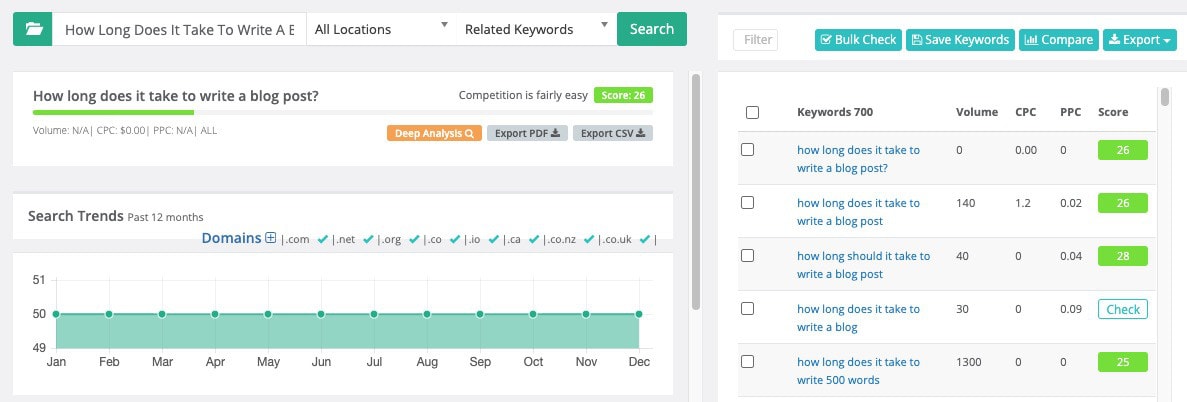
So how to know if the keyword is easy to rank for? Well, that’s something SEOs and marketers have been debating for decades now. Google isn't going to tell us, so we have to either use our own judgement or take the guesswork out of it by using a keyword tool.
Once you go down this rabbit hole, you’ll find that the results from every tool can be wildly different. And that’s a problem unless you’re comparing apples with apples. Stick with one tool, learn how to interpret the results, and build from there. I recommend Keysearch for beginner bloggers.
How to write blog posts faster
Some quick tips to help you create content faster while not compromising on quality.
Do your research
It’s important to find out what competitors in your niche are talking about and make sure you’re on the right track. If you decide to write a blog post about “YouTube SEO” and the top-ranking pages on Google are only talking about optimizing thumbnails, then you will struggle to get traffic to your post if you don’t mention thumbnails. That’s just the way it is.
Look at what’s ranking on Google to get a feel for the content that is “expected”. And by the way, if the top 10 are all YouTube videos, writing a blog post is not the best idea.
Use Surfer SEO to understand the correct content length, keyword count, and more.
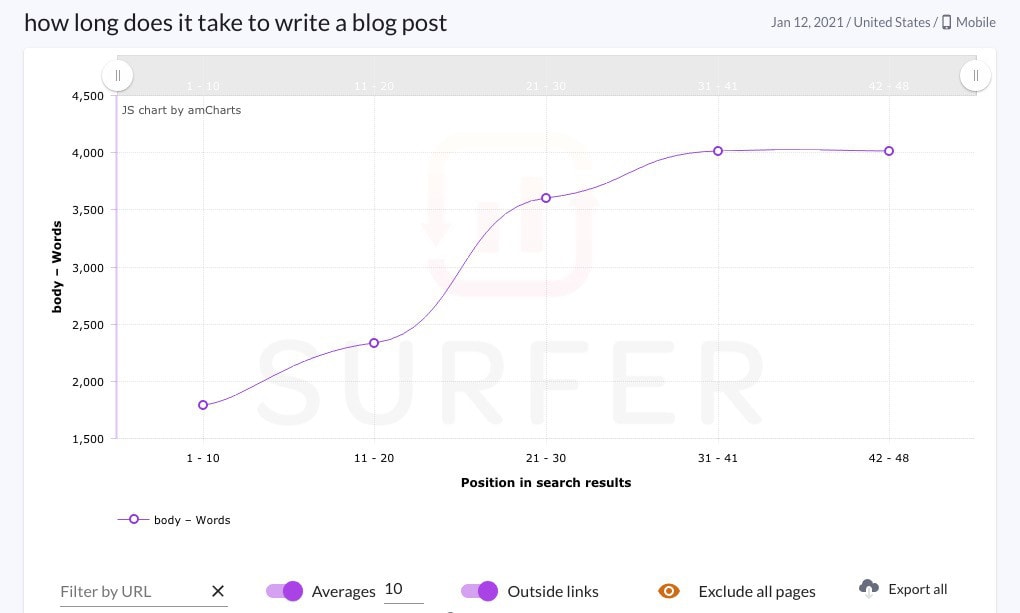
Create an outline
When I started writing this post, I decided on the headers and topics I wanted to talk about before I even started writing. This helps in two ways. The first way it helps is that it helps me structure the post and improves readability. Secondly, it helps smooth the writing process.
A wall of blank paper (or computer screen) can be intimidating. But when you break up your work into small bite-sized chunks or paragraphs with headings, your task becomes much more manageable. At least it feels less overwhelming.
The following content writing tools and AI content tools will help you break writer's block by helping you create outlines, intros, calls-to-action, and social media posts, and can even give you blog post ideas if you learn how to use them properly.
- Frase – outline your blog posts, research competitors, and use AI writing algorithms to predict and complete sentences and entire paragraphs
- Copy.ai – The best copywriting and content writing assistant
- Outranking – one of the newest and fastest-growing writing assistants with AI technology
- Jasper – billed as a complete blog post writing tool. It's not there yet but this software can quickly help you build an article piece by piece
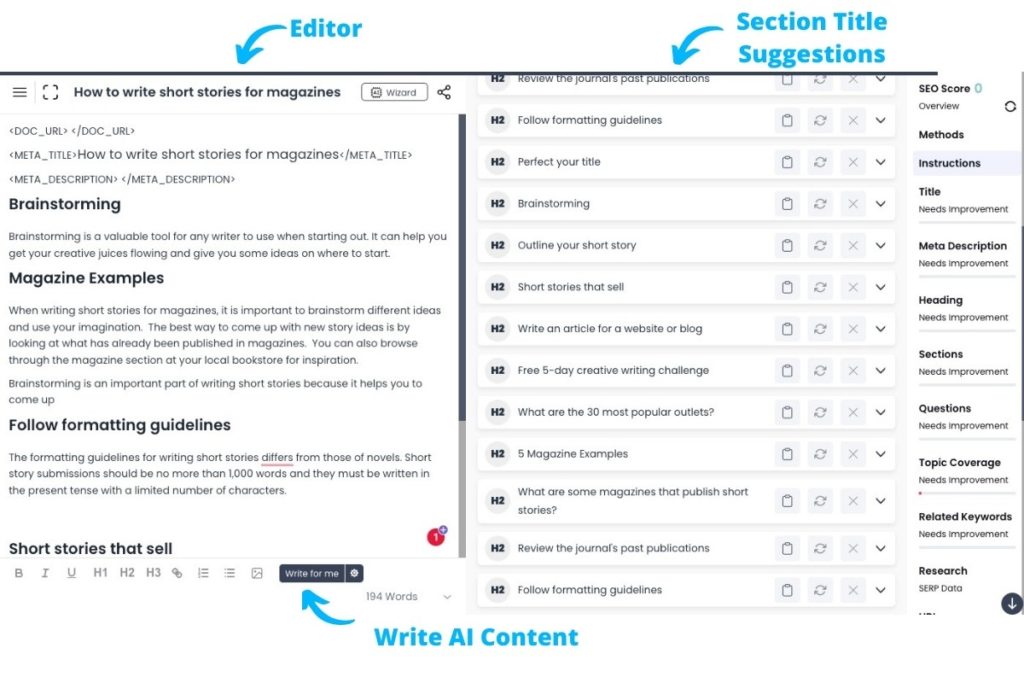
Dictate the first draft
Google Docs, Microsoft Word, and most apps in macOS offer dictation tools. If you want to get some ideas down fast and you’re not the fastest at typing, speaking and dictating the content first might be a faster route to getting started. Of course, you’ll have to edit the content later, unless you’re the world’s clearest speaker. But many people find this method easier to do and it will drastically improve your “writing speed”.
If you prefer to record your voice in a professional audio tool or you already have, say, a podcast, that you’d like to turn into a blog post, use a service like GoTranscript or a tool like Otter.ai to transcribe your voice.
Choose your writing tool
Don’t feel comfortable writing in Word? Use a simple text editor. Apps like Drafts for the Mac can help remove distractions and keep you focussed on the text.
Use Google Docs for a straightforward way to create, backup, format, and research content. Did you know you can use Google Docs to define words and research topics based on keywords? Just highlight a word or phrase and right-click!
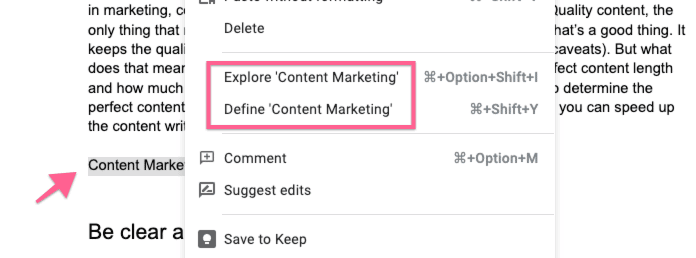
Another cool feature is the handy auto-complete assistant which can speed up your writing by offering to finish your sentences. When the AI understands what you might be about to write, it suggests the next few words. Sounds creepy, but it’s really helpful and a massive time-saver.
Edit, proofread and improve Quickly
While tools like Word, Docs, and Drafts can help with the editing process, a professional editing tool like ProWritingAid will do a much better job. You can even compose in ProWritingAid’s web editor. Fix grammar issues, clichés, style problems, and use suggestions to make your writing snappier, more interesting, and of a higher quality.
Get writing tips, grammar pointers, style guides, and other helpful advice from the internet's best writing improvement tool. Save time and money by using PWA as your proofreader and editor.
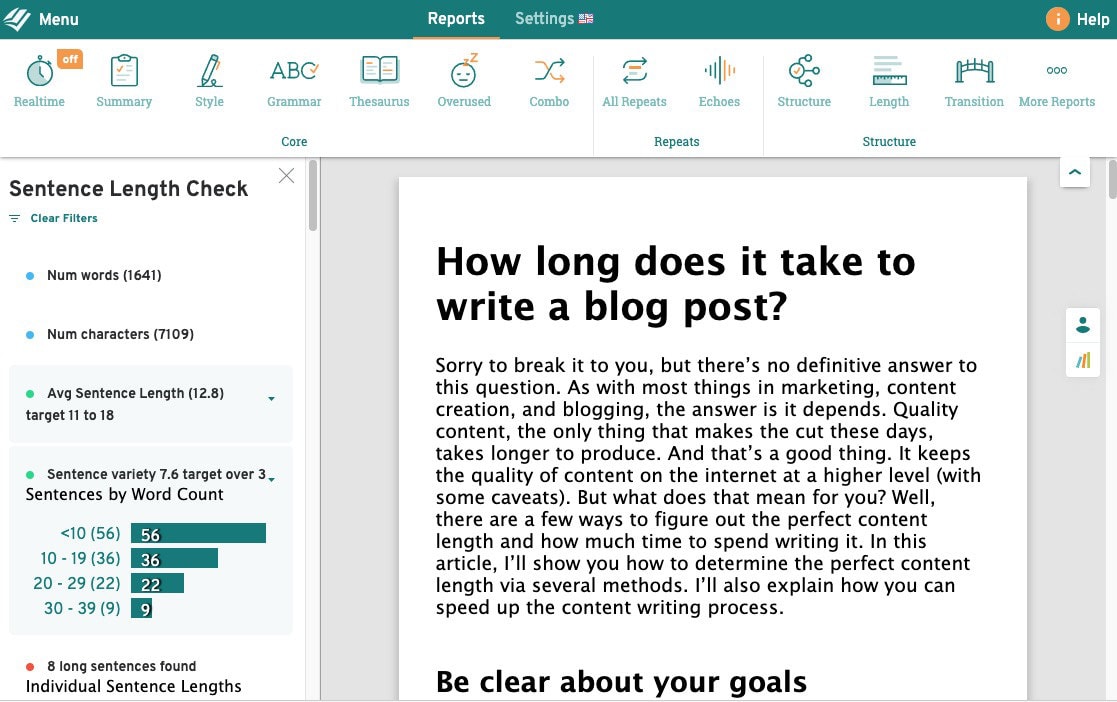
Increase your typing speed
This is one of the best “hacks” for speeding up the blog writing process. Typing.com is just one of the many websites that will help you (often for free) to learn to type faster. When you can type without spelling mistakes as fast as you can speak, you will vastly increase efficiency and unlock the power of fast content creation.
Use snippets and macros
If you write content that regularly includes common phrases, URLs, addresses, or even entire paragraphs, you should install one or both of the following tools
Text Blaze – for repetitive tasks that require entering the same information over and over again, it’s an invaluable tool that can save a surprising amount of time. But even when it comes to blog topics, Text Blaze can help you save time when inserting affiliate links, writing conclusions, creating outlines, and more.
Alfred – a wonderful Mac-only app that will speed up everything on your computer. Use it to instantly paste lengthy URLs, addresses, responses to emails, and blog sections. Create complex workflows and get faster access to writing tools and research with keystrokes.
How long does it take to write a post
It’s impossible to give the definitive answer on how long it should take to write a blog post because there are so many factors involved but take this as a rough estimate.
A handy non-scientific table:
| Type of Content | Time to write 500 words | 1000 words | 1500 words | 3000 words |
|---|---|---|---|---|
| Non-technical | 30 | 60 | 80 | 180 |
| Technical | 40 | 90 | 120 | 240 |
| YMYL (E.A.T.) | 50 | 120 | 180 | 300 |
Once you've mastered the art of writing content quickly, you will discover more opportunities in the world of freelance writing, niche website creation, and business communication.

Thank you so much Zeroniche! Helpful!!!